Websites have become imperative for a strong digital presence. Gone are the days when having a website was a luxury. Now the website has climbed to the top priority of businesses. Also, having a website is not enough; the websites now need to be highly responsive and well optimized for search engines.
According to Statista, mobile devices account for over half of the global traffic. Around 55% of website traffic is through mobiles. This shows how important it is to have a website that is responsive for mobile devices. Any website that loads incorrectly on mobile devices will deter the user experience. According to Formstack, smartphone conversions account for 64% of the total eCommerce business. This further alleviates the importance of having a smooth mobile website as it results in better business.
Traditional website builders may not be very effective when it comes to creating mobile-friendly devices. Therefore new website builders totally focused on responsive websites are coming up. This blog lists ten responsive website builders that can be used to create mobile-friendly websites.
1. IONOS
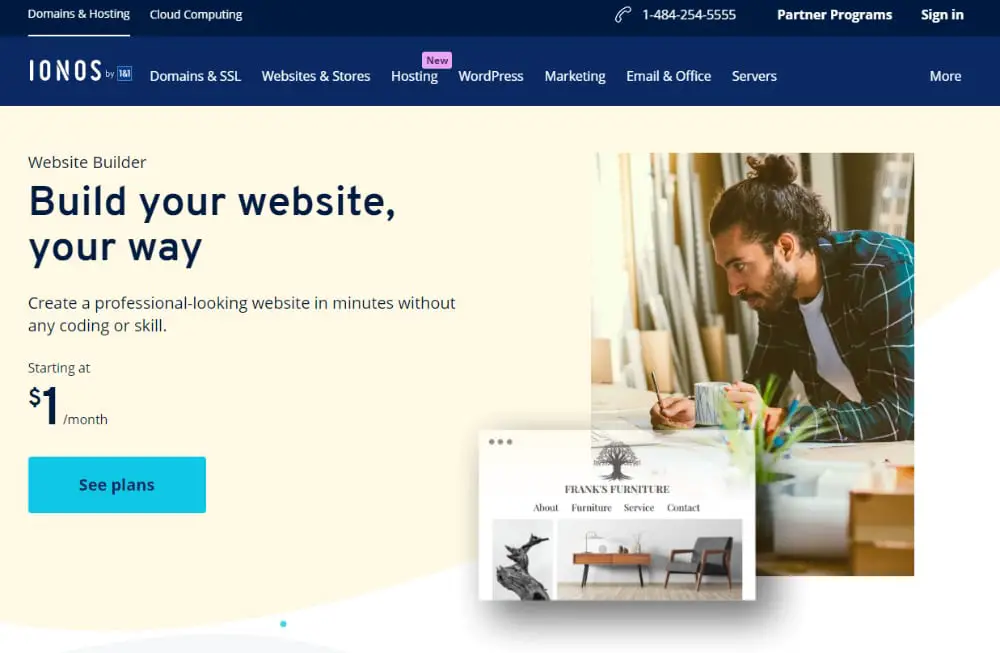
IONOS by 1&1 is one of the most promising website builders today. Without any coding skills, it lets you create a professional-looking website within minutes. It hosts hundreds of visually stunning templates that you can pick and start building your website. Unlike many other website builders, IONOS offers you a wide range of customization options so that you can build your website exactly the way you want.
One striking feature that pushes IONOS to the top of the chart is its media library. It offers over 17,000 high-quality photos for you to choose from, making website development a lot faster and more efficient. Even though it lets you customize a lot, it ensures that your website is highly responsive and scores well on the SEO front. Apart from the creative website building functionalities, it also offers privacy tools, analytics, emails and much more. With its basic package starting at just $1/month, it is set to make the website making process accessible to all.
2. Wix
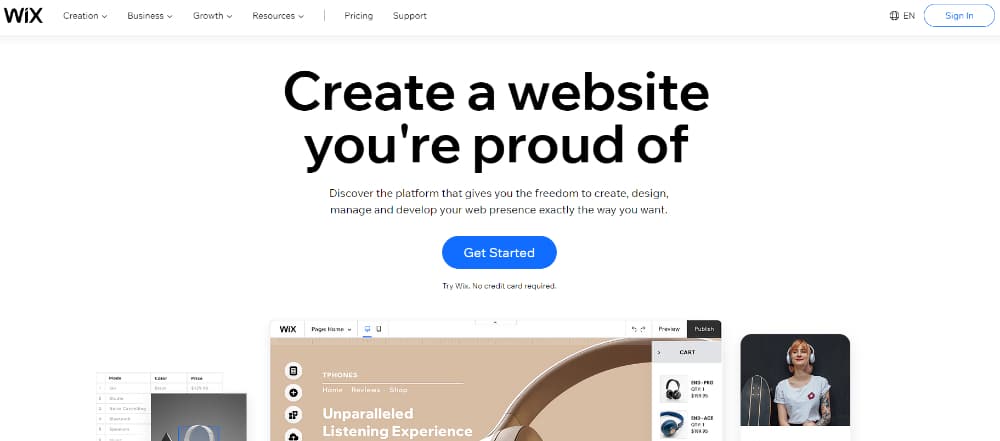
Wix boasts over 200 million users making it one of the most used website builder platforms on the internet. The good part about them is that they keep bringing new updates almost every month. Over time, they have launched their own solutions when it comes to e-commerce, listings and marketing. What the users like the most about Wix are the thousands of ready-made templates it offers. All these are easy to implement, mobile-friendly and optimized for SEO. Recently, they have launched Wix ADI, a website assistant that can guide beginners through the entire website development journey. The Wix App market offers a variety of solutions for users to make their website even better.
However, Wix may not fare well for making large websites (20+ pages). Its navigation is simple, and this creates issues in setting up the right gateways and internal linking. The templates look visually stunning, but that is because of the use of animations and videos. Hence when you actually use the theme, your website may not turn out to be as flashy as the template. Some of the users, such as website developers, may see limited customization options. But for all kinds of business owners, Wix would be a great choice.
3. Jimdo

A German-based website creator, Jimdo is a little less known in the US market but presently hosts over 20 million websites. Right from their start, they have focussed on ease of use. This has ensured that it is very easy for users to build their websites using Jimdo. Recently, they have launched Jimdo Dolphin, which lets you create an entire website without any code in just 3 minutes. This becomes a huge selling point for small and medium scale enterprises who are looking for a simple and informative website for their business. The tool works in a simple way; it asks all the basic details from you, lets you choose design options and then creates the entire website for you that you can later customize.
Because their templates are basic and simple, they load really fast and are responsive for all devices. They also allow you to add an online store to your website. Apart from this, they also have a Jimdo Creator tool that lets you customize the code of the website. This tool is useful for website developers who want to fine-tune the website. However, because they are focused too much on simplicity, they do not offer many other builders’ features.
4. WordPress

WordPress presently powers over 41% of all websites on the internet. This shows how widely this website-building platform is used and it’s market dominance. It is extremely powerful, offers a lot of customization, and is very easy to set up and use. It lets you create any type of website, be it a full-scale online shop, portfolio, or newspaper-style blogging website. Given its decades of experience, WordPress has matured into an entire creative world for website developers.
Website developers like WordPress because it offers a lot of options in terms of website hosting, varied plugins, fancy themes, and a dedicated support system for users. But all this comes at a cost. The source code may be open source but it comes with security risks. That is why WordPress has gained a bad reputation for itself regarding websites getting infected with malware. Also, the content management system it provides for the backend is a bit complicated for beginners. To achieve desired results, developers need to add a lot of customized coding.
5. Strikingly
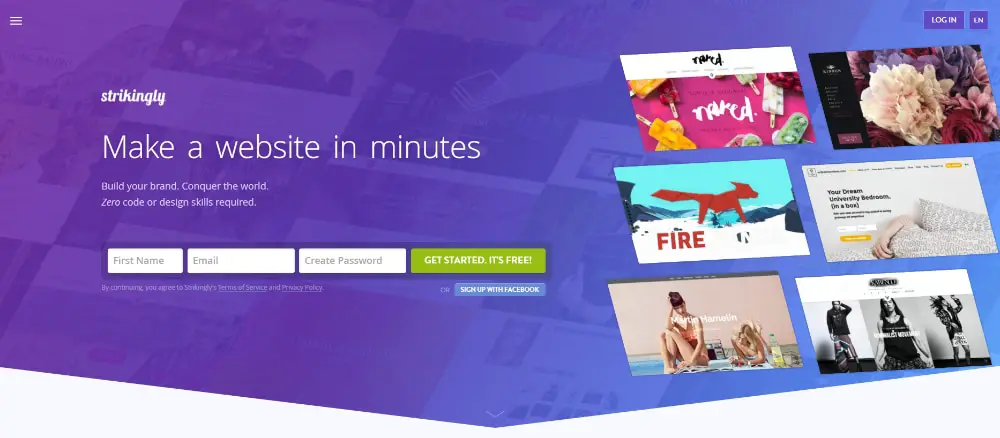
Strikingly stands true for its name of creating visually striking websites. It is doing well in terms of creating good landing pages. These pages are loaded with good visual elements like animations, transitions, and image or video blocks. The good part is that even though the pages look complicated from the development point of view, they are still very responsive. The user interface is quite simple, and any business owner with no prior coding knowledge can create a good website to represent a strong brand presence online.
Strikingly offers a variety of plans starting from an ad-sponsored free plan to a VIP plan that is loaded with features. It also has a good support system in case users are stuck anywhere. However, its strength of building one-pager websites is its weakness also. The first is that Google does not like the one-pager website as they have limited content, and hence your website would not do well in terms of SEO. Also, if you are looking to build a bigger website of multiple pages, the limitations of Strikingly stand exposed.
6. Squarespace

Another big player in the website builder industry is Squarespace. It has been in this space since 2003 and boasts of catering to million websites. Its website is really neat and clean and gives a very encouraging first impression. Its initial forte was offering really good bloc functionality, but now, they have expanded its services to include online stores and other functionalities over the years. Like WordPress and Wix, it also offers hundreds of well-designed themes that are mobile responsive.
The templates they provide are easy to customize, and therefore you can quickly set up your website using them. Its live chat support is a big plus for amateur developers, and it has extended its page limit to 1000, which lets you accommodate big eCommerce websites. However, a couple of areas that it lags behind its competitors is in providing an autosave option and a better navigation feature. Also, users complain that the loading speed is quite high, resulting in lower SEO scores.
7. GoDaddy
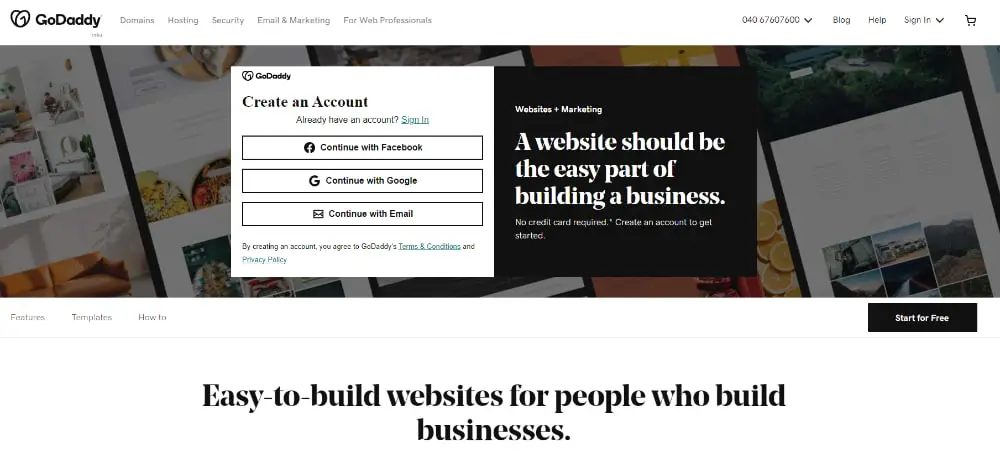
GoDaddy has carved its niche for selling domains and hosting servers. But now it has also entered the website building market. GoDaddy Websites + Marketing service provides users with a holistic toolkit that can help them design their website easily. And it does not stop at that; it also pushes the marketing further but allows them to run email marketing, social media management, content blogging, and SEO. Though new in this segment, this module looks promising for young entrepreneurs who want websites with the sole purpose of marketing.
The layouts that it provides are optimized for smartphones. The good part is that even their website builders work well on smartphones in case developers want to work using their phones. Despite all these features, it is losing out on business because of the lack of an app store and no good integrations. Another problem is that the SEO features are dependent on the package you take. Hence base package offers minimal SEO customizations. Users will have to pay a lot of money if they want their website to be well optimized and rank well on Google.
8. Weebly

With over 40 million websites built on Weebly, it is one of the best website builders, especially for simple websites. It scores very high for the ease of use of its website builder, making it a good choice for users with no website development knowledge. It also offers a huge volume of themes for users to choose from. All the themes are visually appealing, well coded and also responsive to work well on all devices. It also has an app store from which users can choose which integrations they want to add.
An added feature it offers is team management. Hence you can assign work to designers and developers for your website, making the workflow easier. But all these features are limiting its customization ability. That is where it is losing a few points compared to its competitors. Another problem is that it does not do well for users wanting to build multilingual websites. Because of these factors, the end result of the website may not be as good as expected.
9. Webnode
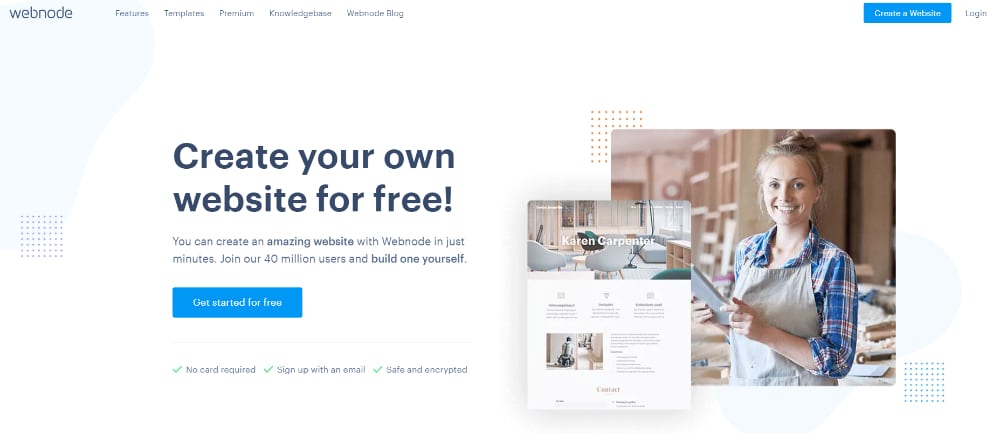
Webnode is the Weebly of Europe! Though it is starting to build a global presence, it is dominantly used in Europe. But just like all things that Europeans like, Webnode is also complicated in terms of its usage. Hence amateur website developers may not find it easy to use. However, it does offer some powerful features for SEO. Also, it allows a second level of navigation, something the majority of website builders do not offer. It also offers an array of themes that are well documented and are also highly responsive.
One aspect that stands out for Webnode is its ability to create multilingual websites. In just a couple of clicks, the developer can create a completely different language version of the website. However, it lags in the eCommerce setup as it has limited development options. The same is the case with blogging, as it does not allow you to create multiple authors or use conventional H1, H2 tags, which proves to be detrimental to the overall SEO of the site.
10. Duda
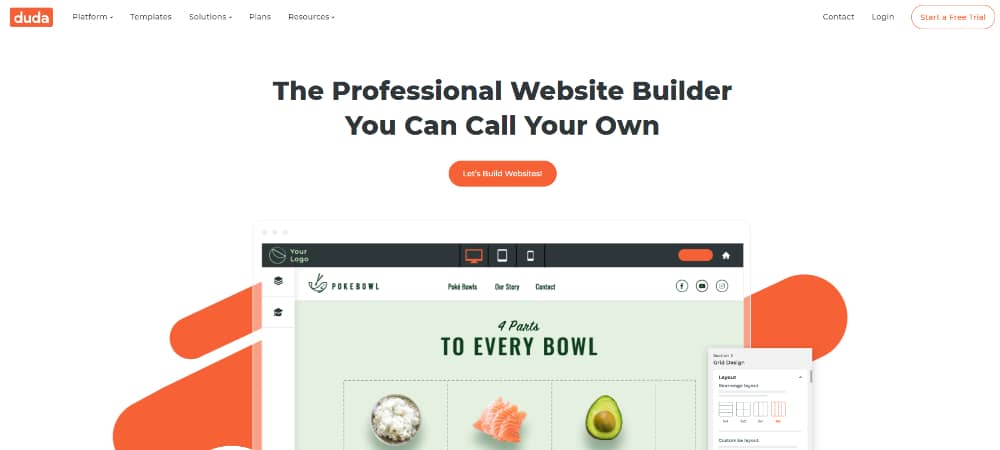
Duda may seem to be a new player in the website builder industry, but it started in 2008 and has a good amount of experience in this space. Like most website builders, its primary focus has been the ease of making websites and add-on functionalities. The templates it offers look visually appealing and are highly responsive. It also has robust structures for SEO which is an added advantage.
One striking feature of Duda is it lets you personalize the website experience based on the user. Depending on the region or time of the user, the website can show different content. This feature can be very useful if you are building a website for global use. On the downside, all these fancy features come at a huge cost, and hence building a website using Duda can be a costly affair. Also, its app store has limited integration options, which can also restrict your website’s functionality.
Conclusion
Choosing a website builder is an important task that will decide how your entire development journey will be. First, you need to earmark features that you need based on the website that you are making. The choice for themes, customization features, and app integrations are some aspects you need to consider. Apart from that, choose a service that provides quick and robust customer support and suits your budget. Above all, you need to make sure that the website you are making is highly responsive and can run smoothly on all devices.

